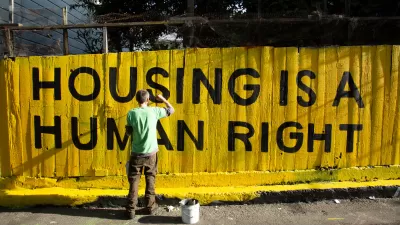Gov. Gavin Newsom signed two ‘behavioral health’ bills that put Proposition 1 on the March 2024 ballot, targeting the housing, mental health, and substance use treatment needs of homeless residents living in encampments. Opposition has arisen.

Behavioral health, a catch-all term that includes mental health and substance use disorders, according to the American Medical Association, is the focus of Proposition 1 that, as of October 16, is the only statewide measure to appear on the March 5, 2024 (Presidential primary) ballot, according to the Secretary of State.
[See Planetizen's earlier post (July 31) on the ballot initiative: “California Ballot Measures Would Aid the Mentally Ill and Drug-Addicted Homeless.” Note that the two measures have now been combined.]
“Governor Newsom signed Senate Bill 326 (Eggman), modernizing the Mental Health Services Act, and Assembly Bill 531 (Irwin), a $6.38 Billion bond to build new behavioral health housing and treatment settings across the state,” states the governor's Oct. 12 press release.
These reforms re-focus billions of dollars in existing funds to prioritize Californians with the deepest mental health needs, living in encampments, or suffering the worst substance use issues. The $6.38 billion bond will provide funding to build more than 11,150 new behavioral health beds and housing and 26,700 outpatient treatment slots – capacity that will touch many tens of thousands of people’s lives every year – filling critical needs across the state for homeless Californians with severe behavioral health issues, to kids suffering from depression, and everyone in between.
Think of the measure as addressing the social infrastructure needs of a large part of the homeless population. In fact, the general obligation bond measure is called "The Behavioral Health Infrastructure Bond Act of 2023.”
“Proposition 1 would rename the Mental Health Services Act, adopted by voters in 2004, to the Behavioral Health Services Act," writes Victoria Antram for Ballotpedia News.
The 2004 initiative [Proposition 63, a citizens-initiated state statute] enacted a 1% tax on income above $1 million and dedicated the revenue to counties to fund mental health services and programs. Proposition 1 would expand the purpose of the act to include substance use disorders.
Antram also lists the three functions where the bond revenues would be directed, including the largest:
- $4.393 billion for grants for behavioral health treatment and housing eligible under the Behavioral Health Continuum Infrastructure Program.
Opposition
As noted in the aforementioned earlier post on the governor's proposal, by redirecting Proposition 63 revenues, it impacts funding for children's mental health services provided by county mental health facilities.
“In reallocating funds in the Mental Health Services Act, Proposition 1 threatens funding for existing outpatient mental health services,” reports Thomas Curwen for the Los Angeles Times in the source article for this post.
The change was probably inevitable, said Rod Shaner, former medical director of the Los Angeles County Department of Mental Health.
The current system of community care, dating back to the [federal] Mental Health Act of 1963, had lost much of its credibility.
“With stresses on society — homelessness, visibility of severe mental illness — it has become apparent that no matter how much money we were putting in community mental health treatment it has not been effective for treatment of everyone with severe mental illness,” he said.
Changes since last post
“Deb Roth, a senior legislative analyst for Disability Rights California, cites a last-minute change to AB 531,” adds Curwen.
For months this year, as the bond measure worked its way through the Assembly and Senate, its funding — $6.38 billion — was earmarked for “an array of voluntary, unlocked, community-based treatment and residential care settings.”
But lawmakers in the last week deleted that language, making funding possible for locked psychiatric facilities.
An earlier LA Times article linked in Curwen's piece on the upcoming ballot measure noted that “Newsom often points to efforts under former Gov. Ronald Reagan to end involuntary commitment and close state-run psychiatric hospitals in the late 1960s as a primary driver for why so many people live on the streets or behind bars today.”
Beyond Proposition 1
Curwen's piece transcends Proposition 1, based on the passage of AB 531 and SB 326, and describes other parts of the governor's “ambition to reform the state’s behavioral health system.” Two days before signing the aforementioned bills, he signed Senate Bill 43, also by Susan Eggman, that includes an “expansion of conservatorship criteria.”
By expanding the definition of “gravely disabled” with the addition of substance use disorder, SB 43, signed Tuesday, allows more opportunities for holding someone against their will, and Proposition 1 will help pay for more mental health campuses, supportive housing including locked facilities and healthcare staff.
CARE Court
Eggman also co-authored “last year’s Community Assistance, Recovery and Empowerment Act, also known as the CARE Act,” added Curwen. The bill, SB 1338, established the CARE Court program that launched on Oct. 2. See fact sheet [pdf] and FAQ [pdf].
“Applications are now being accepted for the program in seven counties across California, including San Francisco, Orange, San Diego, Riverside, Stanislaus, Tuolumne and Glenn counties,” reported Melanie Wingo for Sacramento TV station KCRA on Oct. 2. “Los Angeles County will begin accepting applications for its CARE program starting Dec. 1,” with the remainder by December 2024.
The new program allows family members and others who are aware of a person's severe mental health condition to refer that person for help through the court system.
Compliance with the court-decided treatment plan is voluntary, which has some families upset, as Curwen reported last month. However, he noted in the source article that the passage of SB 43 may enable compulsory treatment for people suffering from mental health and substance use disorders resulting in an expansion of conservatorships that may overwhelm the mental health system.
FULL STORY: California is reinventing how it deals with mental illness. Now the locals have to make it work

Maui's Vacation Rental Debate Turns Ugly
Verbal attacks, misinformation campaigns and fistfights plague a high-stakes debate to convert thousands of vacation rentals into long-term housing.

Planetizen Federal Action Tracker
A weekly monitor of how Trump’s orders and actions are impacting planners and planning in America.

Chicago’s Ghost Rails
Just beneath the surface of the modern city lie the remnants of its expansive early 20th-century streetcar system.

Bend, Oregon Zoning Reforms Prioritize Small-Scale Housing
The city altered its zoning code to allow multi-family housing and eliminated parking mandates citywide.

Amtrak Cutting Jobs, Funding to High-Speed Rail
The agency plans to cut 10 percent of its workforce and has confirmed it will not fund new high-speed rail projects.

LA Denies Basic Services to Unhoused Residents
The city has repeatedly failed to respond to requests for trash pickup at encampment sites, and eliminated a program that provided mobile showers and toilets.
Urban Design for Planners 1: Software Tools
This six-course series explores essential urban design concepts using open source software and equips planners with the tools they need to participate fully in the urban design process.
Planning for Universal Design
Learn the tools for implementing Universal Design in planning regulations.
planning NEXT
Appalachian Highlands Housing Partners
Mpact (founded as Rail~Volution)
City of Camden Redevelopment Agency
City of Astoria
City of Portland
City of Laramie





























